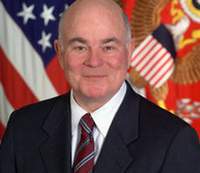Army Secretary Francis J. Harvey resigns
It began with reports of mice and moldy plaster, but after two weeks of outrage, the scandal over poor conditions at leading military hospital Walter Reed Army Medical Center has claimed several careers - including that of the civilian leader of the U.S. Army.

Army Secretary Francis J. Harvey's abrupt dismissal Friday came under withering criticism from Pentagon chief Robert Gates, who said the Army's response to the substandard conditions for the war-wounded was defensive, and not aggressive enough.
His dismissal left the door open for more personnel changes, as investigations continue and Congress prepares for hearings next week.
Harvey's departure was the most dramatic move during two weeks of furor over the treatment of soldiers at one of the military's highest-profile and busiest medical facilities, the AP said.
President George W. Bush has ordered a comprehensive review of conditions at the nation's network of military and veteran hospitals, which has been overwhelmed by injured troops from the wars in Iraq and Afghanistan.
Gates said Harvey had resigned, but senior defense officials, speaking on condition of anonymity, said Gates had privately demanded that Harvey leave. Gates was displeased that the officer Harvey had chosen as interim commander of Walter Reed - Lt. Gen. Kevin Kiley, the current Army surgeon general and a former commander of Walter Reed - has been accused by critics of long knowing about the problems there and not improving outpatient care.
"I am disappointed that some in the Army have not adequately appreciated the seriousness of the situation pertaining to outpatient care at Walter Reed," Gates said in the Pentagon briefing room. He took no questions from reporters.
As Army secretary, Harvey is the service's top civilian official. He commands no troops. Along with the four-star general who is Army chief of staff, the secretary has statutory responsibility for training and equipping the Army. That includes responsibility for budgeting, recruiting and other personnel and resource policies.
Harvey was at Fort Benning, Georgia, on Friday morning when he cut short his visit to return to Washington to meet with Gates.
In an interview in his office shortly after the announcement, Harvey said he offered Gates his resignation because he believed the Army had let the wounded soldiers down. He said the furor has depressed the staff at Walter Reed, and he wanted to prevent any others from leaving or being fired.
"We can't have them leave," he said. "We can't have them be so demoralized that they leave. So I figured, what the heck, if I offer my resignation that may stop all this bleeding, and it was accepted."
Asked if Gates had prodded him to leave, Harvey acknowledged the secretary was not happy with the way the Army had handled the matter. But he said he had been thinking about stepping down for a few days.
"I submitted my resignation," Harvey said, and added: "We let the soldiers down, I'm the head of the Army. I thought it was necessary to do that."
On Thursday, Harvey fired the medical center's previous commander, Maj. Gen. George Weightman, for failures linked to the outpatient treatment controversy. Many had speculated that Weightman would be relieved of command, but Harvey's departure was a surprise. His last day in the job will be March 9.
In addition, the Army took disciplinary action against several lower-level soldiers at Walter Reed, but officials have declined to publicly confirm any details of those actions.
Peter Geren, the undersecretary of the Army, will serve as Harvey's temporary replacement until Bush nominates a new secretary.
The Army announced Friday that Maj. Gen. Eric B. Schoomaker, 58, will be the new commander of Walter Reed, which is located in Washington.
"From what I have learned, the problems at Walter Reed appear to be problems of leadership," Gates said. "The Walter Reed doctors, nurses and other staff are among the best and most caring in the world. They deserve our continued deepest thanks and strongest support."
The revelations about shoddy facilities and wounded soldiers enduring long waits for treatment have embarrassed the Army and the Bush administration at a time when the White House is scrambling to shore up eroding support for the Iraq war. They have prompted numerous calls in Congress for more information, and sullied the reputation of what is supposed to be one of the military's foremost medical facilities.
The White House said the president would name a bipartisan commission to assess whether the problems at Walter Reed exist at other facilities. Last week, Gates created an outside panel to review the situation at Walter Reed and the other major military hospital in the Washington area, the National Naval Medical Center at Bethesda, Maryland.
The actions came after The Washington Post documented squalid living conditions for some outpatient soldiers at Walter Reed and bureaucratic problems that prevented many troops from getting adequate care .
Harvey has been Army secretary since November 2004, the AP reports.
He is the second Bush administration Army secretary to be removed abruptly from office. In April 2003, Defense Secretary Donald H. Rumsfeld fired Thomas White, who had engaged in public disputes with Rumsfeld.
Subscribe to Pravda.Ru Telegram channel, Facebook, RSS!

